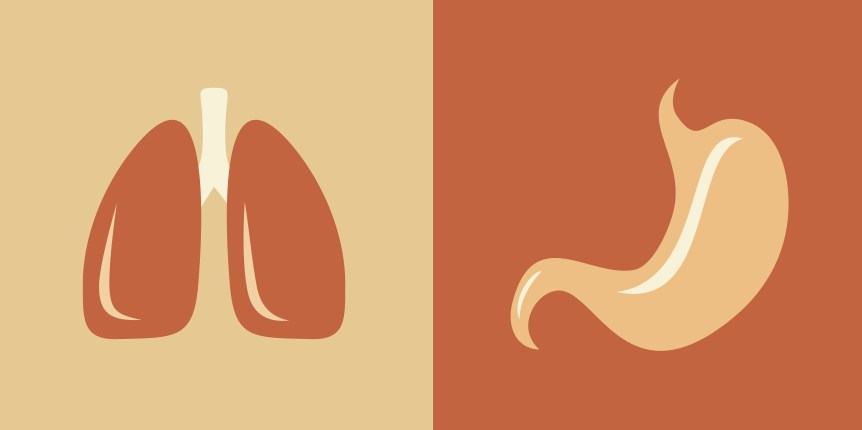Respiratory illness in children with gastroesophageal reflux: Are acid blockers part of the problem?

Gastroesophageal reflux disease (GERD), in which stomach acids back up into the esophagus, is increasingly diagnosed in children. One study based on insurance-claims data found that GERD diagnoses in infants more than tripled between 2000 and 2005 (from 3.4 to 12.3 percent). In addition to heartburn and chest pain, GERD has been implicated in cough, wheezing and pneumonia.
To reduce such acid-related symptoms, doctors increasingly prescribe acid suppression medications such as proton pump inhibitors (PPIs). They’re among the most-prescribed drug classes in the U.S. But clinicians in the Aerodigestive Program at Boston Children’s Hospital noticed that a large number of their GERD patients had lung cultures positive for bacteria, and that a strong predictor was the amount of non-acid reflux the child had.
“We then had to ask the question, ‘are acid suppression medications, which are being prescribed to treat respiratory symptoms, actually worsening the problem?’” says program director Rachel Rosen, MD, MPH. “What are these medications doing to change the bacteria composition in children?”
Previous reports have noted complications with acid suppression including problems with nutrient absorption, pneumonia and serious C. difficile diarrhea in the elderly, especially with long-term use. Rosen led a five-year study (see here and here) that further suggests that reducing stomach acid—which has antibacterial properties—isn’t always a good thing for children.
Her team studied more than 100 children ages 1 to 18 who were undergoing endoscopy and bronchoscopy to evaluate chronic cough; some children also had multichannel intraluminal impedance with pH testing to measure the amount of reflux in the esophagus. Half of the children were taking PPIs and half were not, according to parents’ reports. The researcher collected gastric and lung fluid to measure bacterial growth, and also performed 16S genomic sequencing of fluid from the stomach, lung and oropharynx (the part of the throat just behind the mouth) to identify rare bacteria.
According to the culture data, 46 percent of the children taking acid blockers had gastric bacterial growth, versus just 18 percent of those untreated. Children on acid suppression also had higher gastric bacterial concentrations, including an increased prevalence of Staphylococcus and Streptococcus—acid-sensitive bacteria that may play a role in upper respiratory tract infections and pneumonia.
The lung cultures didn’t show differing amounts of bacteria between treated and untreated patients, perhaps because the lungs carry high rates of bacteria in this symptomatic population. But there was a significant relationship between the amount of non-acid reflux in the esophagus and bacterial concentrations. “This supports the idea that non-acidic reflux can travel through the length of the esophagus and change the bacteria of the lungs,” says Rosen.
“We also found that the bacteria of the gastric and lung fluid were much more similar to each other than to the oropharyngeal flora,” she adds. “This suggests direct communication between these two sites independently of the mouth.”
Eight bacterial species found in the children’s stomach and lung fluid were not found in the oropharynx at all, suggesting that stomach contents were being directly aspirated into the lungs. Two of these eight species were highly correlated with full-column reflux (fluid backup all the way to the top of the esophagus), further evidence that reflux is a viable mechanism for lung disease in children with GERD.
While more research is needed to further connect the dots, acid suppression therapy clearly alters the stomach’s bacterial profile and may impact lung microflora through full-column reflux, the researchers write. At the least, the data should give doctors pause before prescribing acid suppression.
“The implications of this research are great,” says Rosen. “We have, for the first time, identified possible bacterial biomarkers for reflux-related lung disease. We have also shown that the microbiome can be altered with the use of acid-suppression medications and that these microbiome alterations may have an impact on infection risk.”
Rosen’s research was supported by grants from the National Institutes of Health, the Translational Research Program at Boston Children’s Hospital and the North American Society for Pediatric Gastroenterology, Hepatology and Nutrition.
Related Posts :
-

A journey through the intestine during colitis, cell by cell
Inflammatory bowel disease (IBD), causing devastating abdominal pain, persistent diarrhea, and rectal bleeding, is hard to control with current treatments. ...
-

‘Everything fell into place’: Innovative POEM procedure lets Peyton eat without pain
Peyton Reed, 14, is a typical teenage boy: He enjoys tennis, video games — and food. So when eating became so painful ...
-

Microvillus inclusion disease: From organoids to new treatments
Microvillus inclusion disease (MVID) is a rare type of congenital enteropathy in infants that causes devastating diarrhea and an inability ...
-

An off-the-shelf tamponade kit provides surgeons with ‘the luxury of time’ during a life-threatening emergency
It was a late Friday afternoon in April when the call came: A young boy was being transferred to Boston ...






